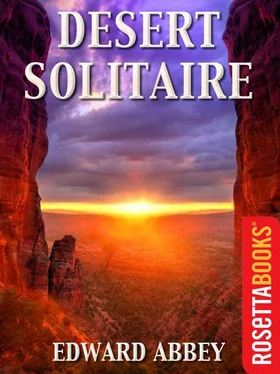Abbey, Edward - Desert Solitaire (Edward Abbey Series )
Здесь есть возможность читать онлайн «Abbey, Edward - Desert Solitaire (Edward Abbey Series )» — ознакомительный отрывок электронной книги совершенно бесплатно, а после прочтения отрывка купить полную версию. В некоторых случаях можно слушать аудио, скачать через торрент в формате fb2 и присутствует краткое содержание. Год выпуска: 2011, Издательство: RosettaBooks, Жанр: Старинная литература, на английском языке. Описание произведения, (предисловие) а так же отзывы посетителей доступны на портале библиотеки ЛибКат.
- Название:Desert Solitaire (Edward Abbey Series )
- Автор:
- Издательство:RosettaBooks
- Жанр:
- Год:2011
- ISBN:нет данных
- Рейтинг книги:4 / 5. Голосов: 1
-
Избранное:Добавить в избранное
- Отзывы:
-
Ваша оценка:
- 80
- 1
- 2
- 3
- 4
- 5
Desert Solitaire (Edward Abbey Series ): краткое содержание, описание и аннотация
Предлагаем к чтению аннотацию, описание, краткое содержание или предисловие (зависит от того, что написал сам автор книги «Desert Solitaire (Edward Abbey Series )»). Если вы не нашли необходимую информацию о книге — напишите в комментариях, мы постараемся отыскать её.
Desert Solitaire (Edward Abbey Series ) — читать онлайн ознакомительный отрывок
Ниже представлен текст книги, разбитый по страницам. Система сохранения места последней прочитанной страницы, позволяет с удобством читать онлайн бесплатно книгу «Desert Solitaire (Edward Abbey Series )», без необходимости каждый раз заново искать на чём Вы остановились. Поставьте закладку, и сможете в любой момент перейти на страницу, на которой закончили чтение.
Интервал:
Закладка:
Hoping to domesticate this sleek, handsome and docile reptile, I release him inside the trailerhouse and keep him there for several days. Should I attempt to feed him? I decide against it—let him eat mice. What little water he may need can also be extracted from the flesh of his prey.
The gopher snake and I get along nicely. During the day he curls up like a cat in the warm corner behind the heater and at night he goes about his business. The mice, singularly quiet for a change, make themselves scarce. The snake is passive, apparently contented, and makes no resistance when I pick him up with my hands and drape him over an arm or around my neck. When I take him outside into the wind and sunshine his favorite place seems to be inside my shirt, where he wraps himself around my waist and rests on my belt. In this position he sometimes sticks his head out between shirt buttons for a survey of the weather, astonishing and delighting any tourists who may happen to be with me at the time. The scales of a snake are dry and smooth, quite pleasant to the touch. Being a cold-blooded creature, of course, he takes his temperature from that of the immediate environment—in this case my body.
We are compatible. From my point of view, friends. After a week of close association I turn him loose on the warm sandstone at my doorstep and leave for a patrol of the park. At noon when I return he is gone. I search everywhere beneath, nearby and inside the trailerhouse, but my companion has disappeared. Has he left the area entirely or is he hiding somewhere close by? At any rate I am troubled no more by rattlesnakes under the door.
The snake story is not yet ended.
In the middle of May, about a month after the gopher snake’s disappearance, in the evening of a very hot day, with all the rosy desert cooling like a griddle with the fire turned off, he reappears. This time with a mate.
I’m in the stifling heat of the trailer opening a can of beer, barefooted, about to go outside and relax after a hard day watching cloud formations. I happen to glance out the little window near the refrigerator and see two gopher snakes on my verandah engaged in what seems to be a kind of ritual dance. Like a living caduceus they wind and unwind about each other in undulant, graceful, perpetual motion, moving slowly across a dome of sandstone. Invisible but tangible as music is the passion which joins them—sexual? combative? both? A shameless voyeur , I stare at the lovers, and then to get a closer view run outside and around the trailer to the back. There I get down on hands and knees and creep toward the dancing snakes, not wanting to frighten or disturb them. I crawl to within six feet of them and stop, flat on my belly, watching from the snake’s-eye level. Obsessed with their ballet, the serpents seem unaware of my presence.
The two gopher snakes are nearly identical in length and coloring; I cannot be certain that either is actually my former household pet. I cannot even be sure that they are male and female, though their performance resembles so strongly a pas de deux by formal lovers. They intertwine and separate, glide side by side in perfect congruence, turn like mirror images of each other and glide back again, wind and unwind again. This is the basic pattern but there is a variation: at regular intervals the snakes elevate their heads, facing one another, as high as they can go, as if each is trying to outreach or overawe the other. Their heads and bodies rise, higher and higher, then topple together and the rite goes on.
I crawl after them, determined to see the whole thing. Suddenly and simultaneously they discover me, prone on my belly a few feet away. The dance stops. After a moment’s pause the two snakes come straight toward me, still in flawless unison, straight toward my face, the forked tongues flickering, their intense wild yellow eyes staring directly into my eyes. For an instant I am paralyzed by wonder; then, stung by a fear too ancient and powerful to overcome I scramble back, rising to my knees. The snakes veer and turn and race away from me in parallel motion, their lean elegant bodies making a soft hissing noise as they slide over the sand and stone. I follow them for a short distance, still plagued by curiosity, before remembering my place and the requirements of common courtesy. For godsake let them go in peace, I tell myself. Wish them luck and (if lovers) innumerable offspring, a life of happily ever after. Not for their sake alone but for your own.
In the long hot days and cool evenings to come I will not see the gopher snakes again. Nevertheless I will feel their presence watching over me like totemic deities, keeping the rattlesnakes far back in the brush where I like them best, cropping off the surplus mouse population, maintaining useful connections with the primeval. Sympathy, mutual aid, symbiosis, continuity.
How can I descend to such anthropomorphism? Easily—but is it, in this case, entirely false? Perhaps not. I am not attributing human motives to my snake and bird acquaintances. I recognize that when and where they serve purposes of mine they do so for beautifully selfish reasons of their own. Which is exactly the way it should be. I suggest, however, that it’s a foolish, simple-minded rationalism which denies any form of emotion to all animals but man and his dog. This is no more justified than the Moslems are in denying souls to women. It seems to me possible, even probable, that many of the nonhuman undomesticated animals experience emotions unknown to us. What do the coyotes mean when they yodel at the moon? What are the dolphins trying so patiently to tell us? Precisely what did those two enraptured gopher snakes have in mind when they came gliding toward my eyes over the naked sandstone? If I had been as capable of trust as I am susceptible to fear I might have learned something new or some truth so very old we have all forgotten it.
They do not sweat and whine about their condition,
They do not lie awake in the dark and weep for their sins.…
All men are brothers, we like to say, half-wishing sometimes in secret it were not true. But perhaps it is true. And is the evolutionary line from protozoan to Spinoza any less certain? That also may be true. We are obliged, therefore, to spread the news, painful and bitter though it may be for some to hear, that all living things on earth are kindred.
CLIFFROSE AND BAYONETS
May Day.
A crimson sunrise streaked with gold flares out beyond Balanced Rock, beyond the arches and windows, beyond Grand Mesa in Colorado. Dawn winds are driving streamers of snow off the peaks of the Sierra La Sal and old man Tukuhnikivats, mightiest of mountains in the land of Moab, will soon be stripped bare to the granite if this wind doesn’t stop. Blue scarves of snow flying in the wind twenty miles away—you wouldn’t want to be up there now, as they say out here, 13,000 feet above the sea, with only your spurs on.
In honor of the occasion I tack a scarlet bandanna to the ridgepole of the ramada, where my Chinese windbells also hang, jingling and jangling in the breeze. The red rag flutters brightly over the bells—poetry and revolution before breakfast. Afterwards I hoist the Stars and Stripes to the top of the flagpole up at the entrance station. Impartial and neutralist, taking no chances, I wish good fortune to both sides, good swill for all. Or conversely, depending on my mood of the moment, damn both houses and pox vobiscum . Swinish politics, our ball and chain.
The gopher snake has deserted me, taking with him most of my mice, and the government trailerhouse is a lonely place this morning. Leaving the coffee to percolate slowly over the lowest possible flame, I take my cherrywood and go for a walk before breakfast. The wind blows sand in my teeth but also brings the scent of flowering cliffrose and a hint of mountain snow, more than adequate compensation.
Читать дальшеИнтервал:
Закладка:
Похожие книги на «Desert Solitaire (Edward Abbey Series )»
Представляем Вашему вниманию похожие книги на «Desert Solitaire (Edward Abbey Series )» списком для выбора. Мы отобрали схожую по названию и смыслу литературу в надежде предоставить читателям больше вариантов отыскать новые, интересные, ещё непрочитанные произведения.
Обсуждение, отзывы о книге «Desert Solitaire (Edward Abbey Series )» и просто собственные мнения читателей. Оставьте ваши комментарии, напишите, что Вы думаете о произведении, его смысле или главных героях. Укажите что конкретно понравилось, а что нет, и почему Вы так считаете.












